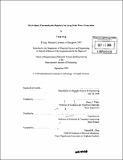Oxide based thermoelectric materials for large scale power generation
Author(s)
Song, Yang, M. Eng. Massachusetts Institute of Technology
DownloadFull printable version (7.687Mb)
Other Contributors
Massachusetts Institute of Technology. Dept. of Materials Science and Engineering.
Advisor
Harry L. Tuller.
Terms of use
Metadata
Show full item recordAbstract
The thermoelectric (TE) devices are based on the Seebeck and Peltier effects, which describe the conversion between temperature gradient and electricity. The effectiveness of the material performance can be described by its figure of merit, ZT, which is defined as ZT = [alpha]²[sigma]T / [kappa] , where a is the Seebeck coefficient of the material, a is the electrical conductivity and [kappa] is the total thermal conductivity, and T is the temperature. In the past, TE power generation has been confined to niche applications. It has been technically and economically more efficient to produce electricity using traditional generators rather than a thermoelectric generator. However, recent significant advances in the scientific understanding of quantum well and nanostructure effects on TE materials properties and modem thin layer and nanoscale manufacturing technologies have combined to create advanced TE materials with high figure of merit (>3). An engineering analysis performed in this study identified large scale waste heat recovery opportunities that are suitable for advanced TE power generation systems.
Description
Thesis (M. Eng.)--Massachusetts Institute of Technology, Dept. of Materials Science and Engineering, 2008. Includes bibliographical references (leaves 63-65).
Date issued
2008Department
Massachusetts Institute of Technology. Department of Materials Science and EngineeringPublisher
Massachusetts Institute of Technology
Keywords
Materials Science and Engineering.